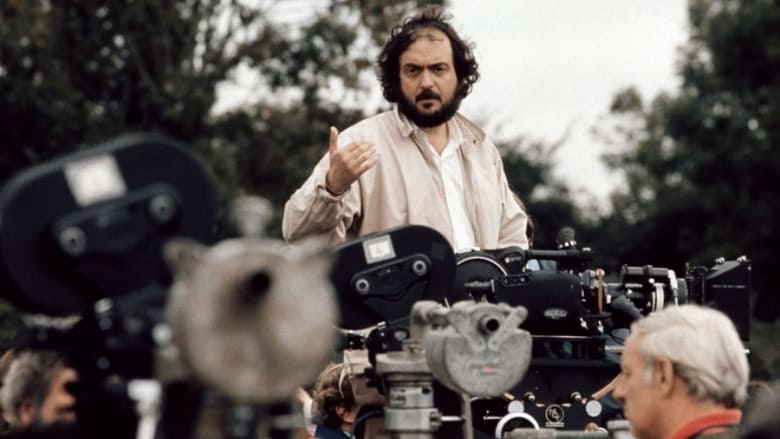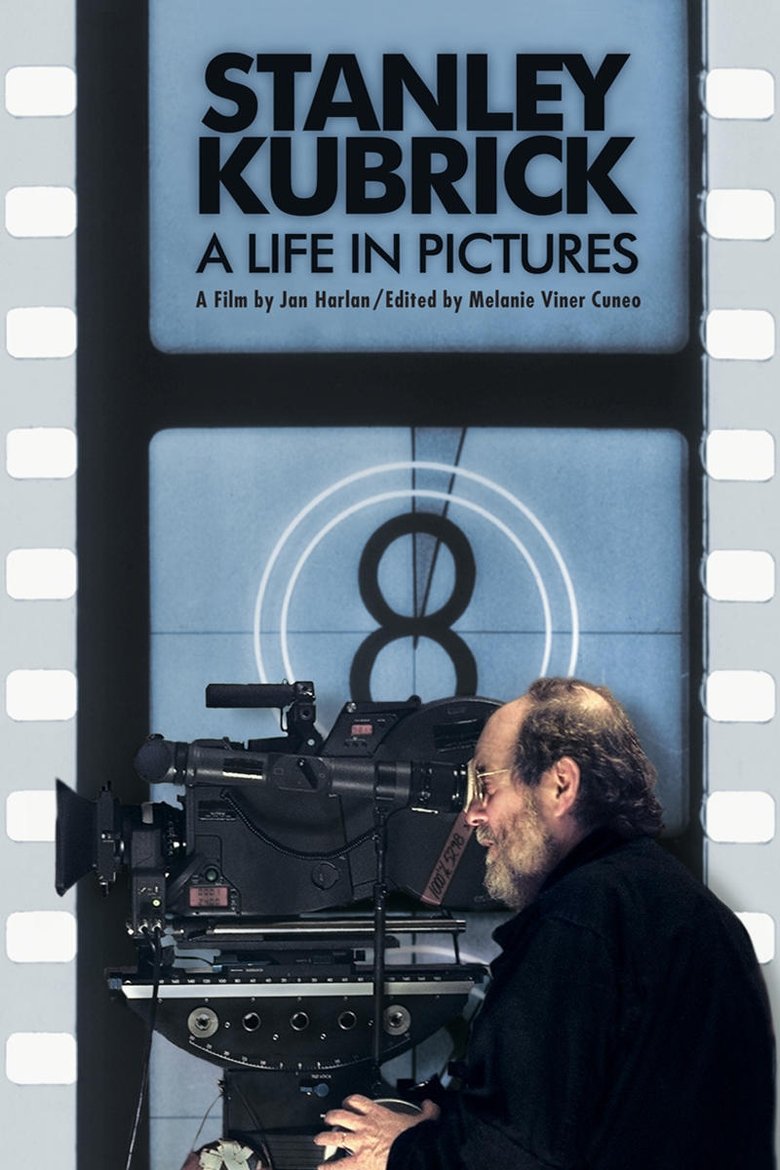

Stanley Kubrick: A Life in Pictures
Genres
Overview
With commentary from Hollywood stars, outtakes from his movies and footage from his youth, this documentary looks at Stanley Kubrick's life and films. Director Jan Harlan, Kubrick's brother-in-law and sometime collaborator, interviews heavyweights like Jack Nicholson, Woody Allen and Sydney Pollack, who explain the influence of Kubrick classics like "Dr. Strangelove" and "2001: A Space Odyssey," and how he absorbed visual clues from disposable culture such as television commercials.
Details
Budget
$0
Revenue
$0
Runtime
141 min
Release Date
2001-05-02
Status
Released
Original Language
English
Vote Count
194
Vote Average
7.402
Tom Cruise
Self - Actor & Film Producer / Narrator
Barbara Kroner
Self - Stanley Kubrick's Sister
Steven Marcus
Self - Professor, Stanley Kubrick's Schoolfriend
Alexander Singer
Self
Paul Mazursky
Self
Jack Nicholson
Self
Shelley Duvall
Self
Matthew Modine
Self
Sydney Pollack
Self
Christiane Kubrick
Self
Richard Schickel
Self
Leon Vitali
Self
Douglas Trumbull
Self
Martin Scorsese
Self
Steven Spielberg
Self
Jan Harlan
Self
Wendy Carlos
Self
Malcolm McDowell
Self
Alan Parker
Self
Keir Dullea
Self
Woody Allen
Self
Milena Canonero
Self
Marie Windsor
Self
Nicole Kidman
Self
0.0
The Real Beauty and the Beast
It's a condition known as "hypertrichosis" or "Ambras Syndrome," but in the 1500s it would transform one man into a national sensation and iconic fairy-tale character. His name: Petrus Gonsalvus, more commonly known today as the hairy hero of Beauty and the Beast.
2013-06-14 | en
10.0
Being and Becoming Chua Ek Kay
The film offers exclusive and intimate insights into how and why the classically trained artist risked rejection to revolutionize the traditional Chinese ink art form in Singapore.
2012-01-01 | en
0.0
The Final Days of Adolf Hitler
2024-06-20 | fr
7.7
When We Were Kings
It's 1974. Muhammad Ali is 32 and thought by many to be past his prime. George Foreman is ten years younger and the heavyweight champion of the world. Promoter Don King wants to make a name for himself and offers both fighters five million dollars apiece to fight one another, and when they accept, King has only to come up with the money. He finds a willing backer in Mobutu Sese Suko, the dictator of Zaire, and the "Rumble in the Jungle" is set, including a musical festival featuring some of America's top black performers, like James Brown and B.B. King.
1996-10-25 | en
7.5
The Revenge of Bernadette Chirac
2023-10-08 | fr
0.0
The Lost World of the Seventies
Michael Cockerell sheds new light on the tragi-comedy of the 1970s by focusing on some of its most controversial characters. With fresh filming and new interviews, along with a treasure trove of rare archive, the film presents the inside story of giant personalities who make today's public figures look sadly dull in comparison. The well-known journalist revisits some of his films on the big characters who helped shaped the 1970s in Britain. Both tragic and comic, it highlights just how much our world has changed in four decades.
2012-05-13 | en
7.4
Breaking Boundaries: The Science of Our Planet
David Attenborough and scientist Johan Rockström examine Earth's biodiversity collapse and how this crisis can still be averted.
2021-06-04 | en
6.9
Roadrunner: A Film About Anthony Bourdain
An intimate, behind-the-scenes look at how an anonymous chef became a world-renowned cultural icon. This unflinching look at Anthony Bourdain reverberates with his presence, in his own voice and in the way he indelibly impacted the world around him.
2021-07-16 | en
6.0
Greek Myths: Tales of Travelling Heroes
Eminent classical historian Robin Lane Fox embarks on a journey in search of the origins of the Greek myths. He firmly believes that these fantastical stories lie at the root of western culture, and yet little is known about where the myths of the Greek gods came from, and how they grew. Now, after 35 years of travelling, excavation and interpretation, he is confident he has uncovered answers.
2010-11-15 | en
6.8
Dig!
A documentary on the once promising American rock bands The Brian Jonestown Massacre and The Dandy Warhols. The friendship between respective founders, Anton Newcombe and Courtney Taylor, escalated into bitter rivalry as the Dandy Warhols garnered major international success while the Brian Jonestown Massacre imploded in a haze of drugs.
2004-05-14 | en
6.0
The Runners
As we run, the layers of responsibility and identity we have gathered in our lives, the father, mother, lawyer, teacher, Manchester United-supporter labels, all fall away, leaving us with the raw human being underneath. With nothing but our own two legs moving us, we begin to get a vague, tingling sense of who, or what, we really are.
2013-11-15 | en
7.7
Deep Purple: From Here To Infinite
Feature length documentary about the story behind the pioneering and influential British heavy metal band as they enter the studio to record their new album.
2017-03-16 | en
6.0
I'm a Porn Star
I'm a Porn Star follows the lives of guys in the neighborhood who are likely a lot more famous than you - at least on the Internet. There are an estimated 370 million pornographic websites on-line. Porn is now a thirteen BILLION dollar business. So who's doing all this moonlighting? Turns out -- probably some people you know.
2013-08-17 | en
6.8
American Hardcore
Inspired by Steven Blush's book "American Hardcore: A tribal history" Paul Rachman's feature documentary debut is a chronicle of the underground hardcore punk years from 1979 to 1986. Interviews and rare live footage from artists such as Black Flag, Bad Brains, Minor Threat, SS Decontrol and the Dead Kennedys.
2006-09-22 | en
0.0
Dolly Parton - From Rhinestones to Rock & Roll
Together, Dolly Parton and GMA's Robin Roberts discuss Dolly's collaborations with numerous rock artists on her new album, including Paul McCartney, Ringo Starr, Pat Benatar, Peter Frampton, John Fogerty, and Steven Tyler. Carly Pearce gives a tour of Dollywood before performing a cover of Jolene.
2023-11-07 | en
9.2
Moleman 4: Longplay
It is the year 2546. Corporations rule the world, and an agent is on a secret mission to explore the untold stories of the past. His journey leads him into a secret virtual reality where one corporation has recreated the 1980s, an era that witnessed the birth of video game development, an event in which a politically and economically restricted small European country, Hungary, had a significant role. He discovers a strange but exciting world, where computers were smuggled through the Iron Curtain and serious engineers started developing games. This small country was still under Soviet pressure when a group of people managed to set up one of the first game development studios in the world, and western computer stores started clearing room on their shelves for Hungarian products.
2017-03-24 | hu
0.0
Tenkrát 2 – Šance pro Slovensko
2000-01-05 | cs
8.0
Tenkrát
1999-11-17 | cs
7.0
D'un Céline l'autre
Passers-by, those who knew him in his youth, René Barjavel, witness of his beginnings, his wife, his doctor, writers ... By questioning them Michel Polac tries to better understand the troubled personality of Louis-Ferdinand Céline, Notorious anti-Semite and genius writer.
1969-05-08 | fr
6.7
His Name Was Jason: 30 Years of Friday the 13th
A retrospective documentary about the groundbreaking horror series, Friday the 13th, featuring interviews with cast and crew from the twelve films spanning 3 decades.
2010-04-20 | en